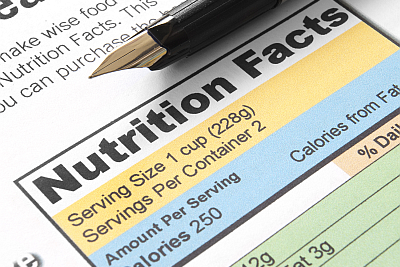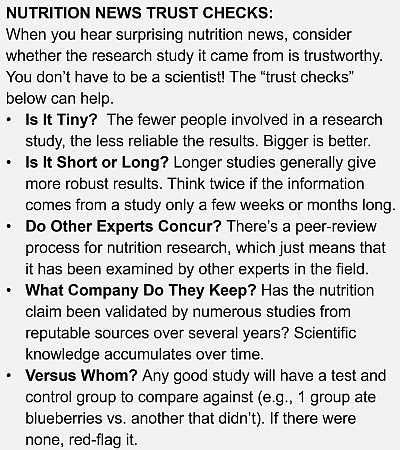Are probiotics the key to good health? Is caffeine a friend or foe? And should we be eating eggs or not?
One glance at the news, internet, or social media, and you’re sure to walk away with yet another recommendation about what to eat (and to avoid) for best health. While it’s great to have so much nutrition information at our fingertips, it can be nearly impossible to keep up, much less determine which advice is worth following. Especially when today’s headline contradicts the one from yesterday!
As the saying goes, you shouldn’t believe everything you read (or hear). Nutrition misinformation is a real problem, as following the wrong advice can be dangerous to your health—not to mention costly. Dietitians say consumers receive the most misinformation from social media, family, friends and celebrities. But, with a few expert-approved pointers, you can become a savvier consumer of nutrition news and learn to sort fact from fiction.
6 Questions to Help You Weigh Nutrition News
That nutrition advice might be newsworthy, but is it trustworthy? If you’re anxious about addressing an important nutrition-related health concern, you may unwittingly be more willing to follow advice from people who are not nutrition professionals or guidance that is not scientifically proven.
Whether you’re looking at a news article or YouTube, reading a book or chatting with your neighbor, here are six questions to ask yourself when seeking and following nutrition advice.
1. Who Is the Source?
 First up, only trust nutrition news from reputable, well-established sources.
First up, only trust nutrition news from reputable, well-established sources.
If your source is a person, look for a Registered Dietitian (R.D. or R.D.N.) or Licensed Dietitian (L.D.) who has a specialized degree in dietetics, nutrition, public health, or related sciences from an accredited university. This means they have completed extensive training in the subject and undergo continuing education on a regular basis. You might also notice advanced medical or research degrees such as M.D. or Ph.D.
This is important because more general terms, such as “nutritionist” and “diet counselor,” are not regulated. Self-proclaimed experts sometimes use these credentials without proper qualifications.
When it comes to food and nutrition, trusted organizations include scientific and professional organizations such as the American Heart Association, American Diabetes Association, American Cancer Society and the Academy of Nutrition and Dietetics.
Seek nutrition departments at leading universities, such as Harvard School of Public Health, New York University, University of North Carolina at Chapel Hill, University of Alabama, and University of Arizona among others. Hospitals or medical facilities that provide nutritional information are also great sources. Lastly, if the website ends in .gov or .edu that’s also a good sign.
2. How Recent Is the Information?
Thanks to rigorous scientific research, we’re constantly learning more about the connections between food and our health. Guidelines sometimes change as the latest and greatest nutrition study results become available.
 To help make sense of the changes make sure that the information you’re looking at is up to date. Don’t rely on dated info from old studies. Rely more heavily on relatively recent nutrition news, for example, information published over the past few years.
To help make sense of the changes make sure that the information you’re looking at is up to date. Don’t rely on dated info from old studies. Rely more heavily on relatively recent nutrition news, for example, information published over the past few years.
What may have been the recommendation a few years ago, may not be the case anymore. We are continually learning how various foods affect our bodies. But whether you’re looking at new information or old, it’s always important to ask yourself whether the information comes from a credible source and whether it’s based on solid evidence.
3. Is There Strong Proof or Evidence?
 The nutrition world abounds with personal stories and testimonials touting products, ingredients and diets that have transformed people’s lives. But even if a story is true (and that’s a big if), it’s not exactly solid evidence.
The nutrition world abounds with personal stories and testimonials touting products, ingredients and diets that have transformed people’s lives. But even if a story is true (and that’s a big if), it’s not exactly solid evidence.
The nutrition information that you put your trust in should have more to it. Before you begin to act on nutrition news, make sure the study that provided the information was in-depth and reliable.
Most of us are not scientists and can’t be expected to interpret scientific studies. Nonetheless, there are a few tell-tale signs that can help anyone flag information that might not be trustworthy (see inset).
Want more help? Learn to decipher nutrition research in the media.
4. Does It Promise a Quick Fix?
It’s tempting to believe that our problems—health-related or otherwise—have a simple solution. But the promise of a quick fix is one of the surest signs of either a fad diet or of questionable nutrition news.
Short-term results, if they do happen, don’t tend to last and may not even be good for you. For example, there is such a thing as losing too much weight too quickly. Bottom line: If the nutrition news or dieting “miracle” sounds too good to be true, it probably is.
5. What Are They Selling?
Take a close look at that nutrition advice. Are they asking you to spend money on a diet plan, special device, or a product? If the content is sponsored, could it be biased?
Before you whip out that credit card, know that these products may not be clinically proven to lead to lasting benefits. What’s more, be aware that scare tactics or exaggerated claims can be used to target people’s deepest desires, such as losing weight, reversing the signs of aging, relieving chronic pain or illnesses, and so on.
While there are many trustworthy products, ingredients and diets being sold to consumers on the market, it’s always important to look for the ones that have a proven track record.
6. Is It Right for Me?
 Even if nutrition advice is sound, it may not be the best fit for you and your lifestyle.
Even if nutrition advice is sound, it may not be the best fit for you and your lifestyle.
Any major lifestyle change should take your health history and goals into account. Athletes, nursing mothers, people with diabetes or food intolerances all have different needs when it comes to diet and exercise. Many of us have special considerations to think about!
That is all the more reason to talk with a licensed R.D. or your primary care provider. Make sure that the information you get fits your personal needs and that your eating pattern is a good fit for YOU, as well as identify any potential pitfalls.
Trust the Experts
Finding reliable info about nutrition (or anything!) these days is tough. But this is your health we’re talking about, so it’s worth taking extra time to ensure the information you take in is worthy of your trust.
Be cautious, stop and ask yourself some of the questions above, and communicate with your health care team. You’ll be on your way to selecting the most reliable nutrition news to help inform your choices.
![]()
You can count on Feed Your Potential 365 as a trusted source of insights and information! We only rely on evidence-based information for our nutrition-related blogs. Our dietitians are licensed experts that put forth the most accurate content for our followers—so you can discover what a healthy lifestyle can do for you.
Note: Since everyone’s health history and nutritional needs are so different, please make sure that you talk with your doctor and a registered dietitian to get advice about the diet and exercise plan that‘s right for you.

